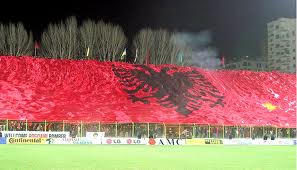By Andrew Warshaw
January 14 – Kosovan football authorities are celebrating a major breakthrough after FIFA finally cleared the national team and clubs to play friendly matches after a long-running dispute that was in danger of derailing any meaningful progress.
Kosovo declared independence from Serbia in 2008 and has been recognised by at least 100 countries including 23 of the European Union’s 28 members. But it has yet to become a member of the United Nations and is not a member of either FIFA or UEFA.
FIFA agreed in principle in May 2012 to allow its member associations to play friendlies against teams from Kosovo but backtracked following a protest from the Serbian authorities. Instead, permission was watered down to allow Kosovo to play friendly matches at “youth, amateur, women’s and club football”.
Even that, however, was jeopardised by FIFA’s insistence that all flags and national symbols – as well as the national anthem – be banned, with no games staged on Kosovar soil “without the prior authorisation” of Serbia.
Some of those restrictions remain. Kosovo will still not, for instance, be allowed to play matches against clubs and representative teams of other countries of the former Yugoslavia until further notice. Also, Kosovan teams may still not display national symbols or play national anthems and teams from Kosovo must give 21 days’ notice of scheduled home matches, and FIFA will inform the Serbia football federation.
“Any breach of this agreement will be referred to FIFA and the agreement will automatically come to an end,” the governing body warned.
But the Kosovans will be allowed to wear kit bearing their name and no longer, crucially, need the express permission of Serbia, which claims the territory as part of its own.
It is by no means clear how the Serbs will react to FIFA’s landmark ruling. UEFA president Michel Platini has also been against giving the Kosovans the green light for fear of it acting as a precedent in terms of other non-United Nations members being brought into the football family.
Yet Kosovo’s frustration is, in a way, understandable. A number of exiled players turn out for other national teams, notably Switzerland who have qualified for the World Cup finals. Manchester United’s teenage prodigy Adnan Januzaj, who has yet to decide which of several countries he wants to play for, would also qualify for Kosovo.
The latest move represents a big step in terms of Kosovo starting to compete at international level six years after it declared independence from Serbia.
“Following various meetings that have taken place since 2012, the FIFA Emergency Committee has today…confirmed a set of modalities of friendly matches involving clubs and representative teams of Kosovo,” FIFA said in a statement.
Kosovo has more than 90% Albanian population and FIFA President Sepp Blatter did not under-estimate the significance of the agreement.
“The decision…represents a major boost for football development in Kosovo and it once again confirms the extraordinary power of our sport to bring people together,” Blatter said.
The decision was hailed as a major victory in Kosovo. “I congratulate Kosovo’s entire sporting community for this achievement,” the country’s Prime Minister Hashim Thaci said on his Facebook page.
“I express the hope that in the near future, the Kosovo Football Federation will be an equal member of UEFA and FIFA where today’s limitations will not be valid any more.”
Contact the writer of this story at moc.l1751596633labto1751596633ofdlr1751596633owedi1751596633sni@w1751596633ahsra1751596633w.wer1751596633dna1751596633

